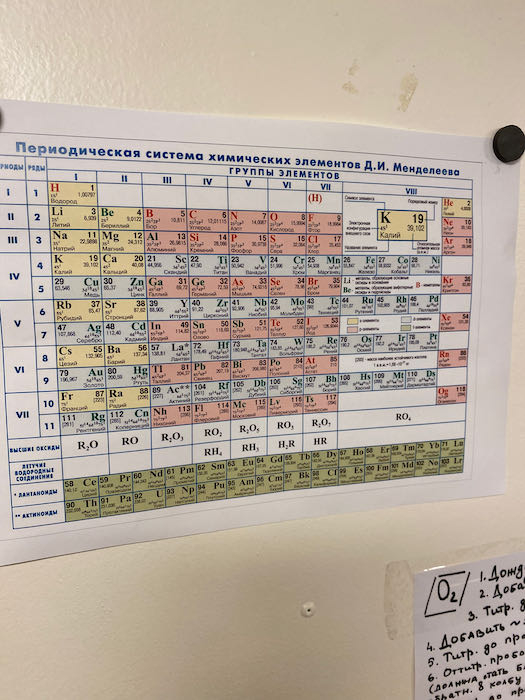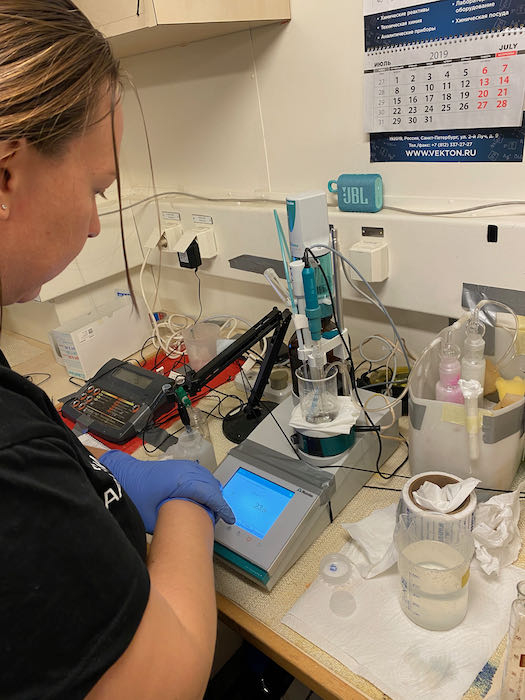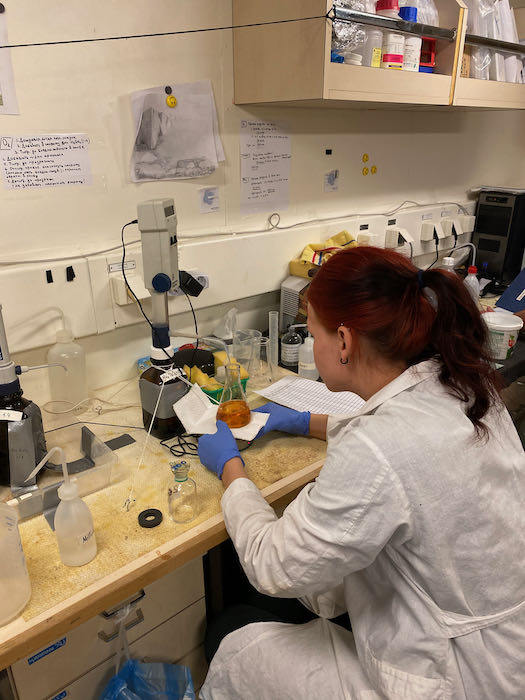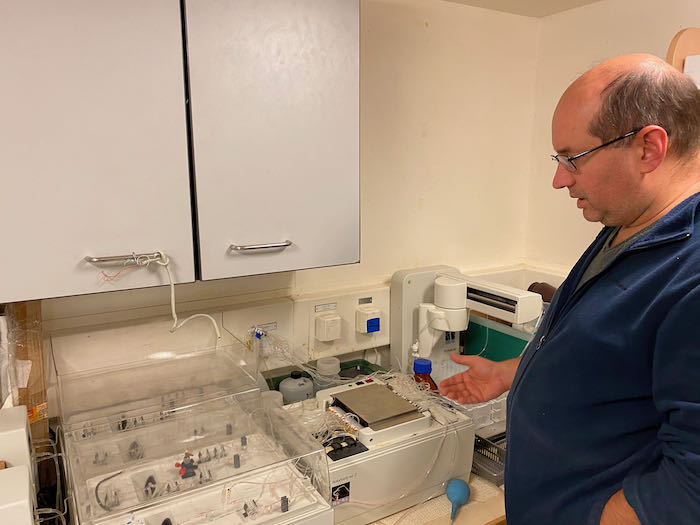In my 9-22-21 Journal, I introduced some of the US scientists on the Chemistry Team. We are working closely with a group of Russian chemists as well. It has been great getting to know and work with them, and I am continually impressed by their ability to communicate in English about science topics (I often tell my bilingual students how fortunate they are to speak multiple languages and that is one of the areas in which I feel totally lacking - who knows, maybe in retirement?!?).
Chemistry students - can you read this?!?
 The Russian Periodic Table. It's arranged a bit differently, and some of the elements seem to be missing.
The Russian Periodic Table. It's arranged a bit differently, and some of the elements seem to be missing.
The chemistry team is also collecting water samples from the rosette, but they are doing chemical analysis for oxygen, alkalinity, and nutrients in an adjacent lab while on board - they are very busy.
We have discussed having them "guest lecture" to my classes once we are all back home. I think my students will really enjoy it.
Natalya "Natasha" Alekseeva - Arctic and Antarctic Research Center (AARI)
 Natasha Alekseeva uses a pH meter and automatic titrator to determine the alkalinity (acid/base properties) of the ocean water.
Natasha Alekseeva uses a pH meter and automatic titrator to determine the alkalinity (acid/base properties) of the ocean water.
Background: Natasha is "ABD" - all but dissertation for her PhD in hydrochemistry and oceanography. She has considerable field work and lab experience, and her research has focused on carbon cycling in freshwater Arctic lakes.
Why the Arctic? Natasha (along with Ivan - introduced below) participated in a research expedition that started in St. Petersburg, Russia, continued to Germany, to South Africa, and included a circumpolar (around the pole) cruise around Antarctica - 6 months in total!
Best Parts of the Job: Learning new things - she has considered a 2nd PhD. Worst Parts of the Job: Separation - she has an almost 3-year-old son at home.
Entertainment for the Ship: Music - she has an amazing playlist.
Ekaterina "Katya" Litina - AARI
 Katya Litina tests for oxygen in the water samples. She is enjoying her time on board, but the ice and snow reminds her that she wishes she was snowboarding.
Katya Litina tests for oxygen in the water samples. She is enjoying her time on board, but the ice and snow reminds her that she wishes she was snowboarding.
Background: Katya studies physical oceanography and geo-ecology, focusing on the Baltic Sea. She loves to downhill and cross-country ski, but snowboarding is becoming her new favorite because of the challenge.
Why the Arctic? When Natasha told her about an opening on this cruise, she immediately jumped on the opportunity because she had never been on an Arctic expedition.
Best Parts of the Job: The adventure - doing "real" science. Worst Parts of the Job: Repetitive lab work - repeating the same chemical test over and over.
Entertainment for the Ship: Video making, pencil drawings of Arctic landscapes.
Ivan Gangnus - Moscow State University
 Ivan Gangnus uses a multi-channel chromatograph device to analyze nutrient samples. This is a 'rare' photo of Ivan because he works nights.
Ivan Gangnus uses a multi-channel chromatograph device to analyze nutrient samples. This is a 'rare' photo of Ivan because he works nights.
Background: Ivan has always loved science and is in charge of nutrient testing, especially on the night shift (I do not see him that often).
Why the Arctic? In addition to participating in the Antarctic circumpolar expedition, as well as many others, Ivan was on the NABOS cruise in 2013 and is here to continue his work.
Best Parts of the Job: Finding something new in science. Worst Parts of the Job: The very long hours.
Entertainment for the Ship: Sleeping - when not in the lab (which is not often), Ivan tries to catch up on his sleep. At home, he likes going to movies.


Comments
Add new comment